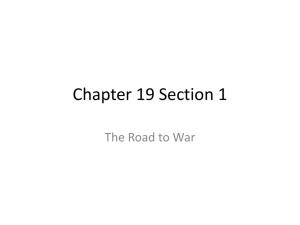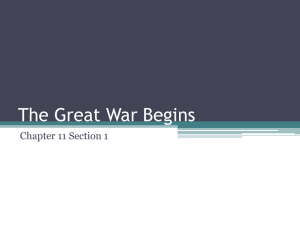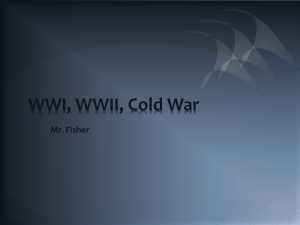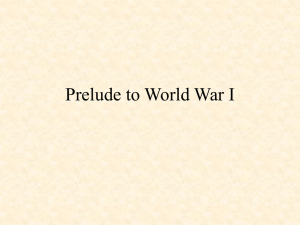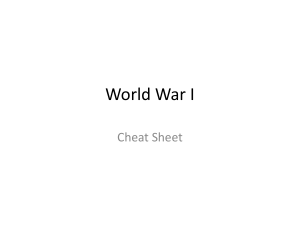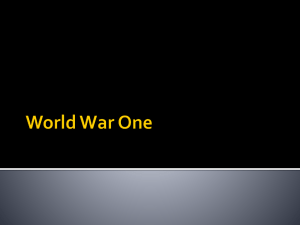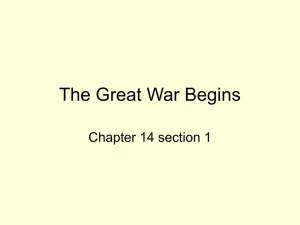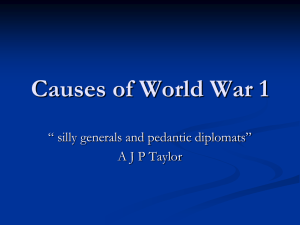WORD
advertisement
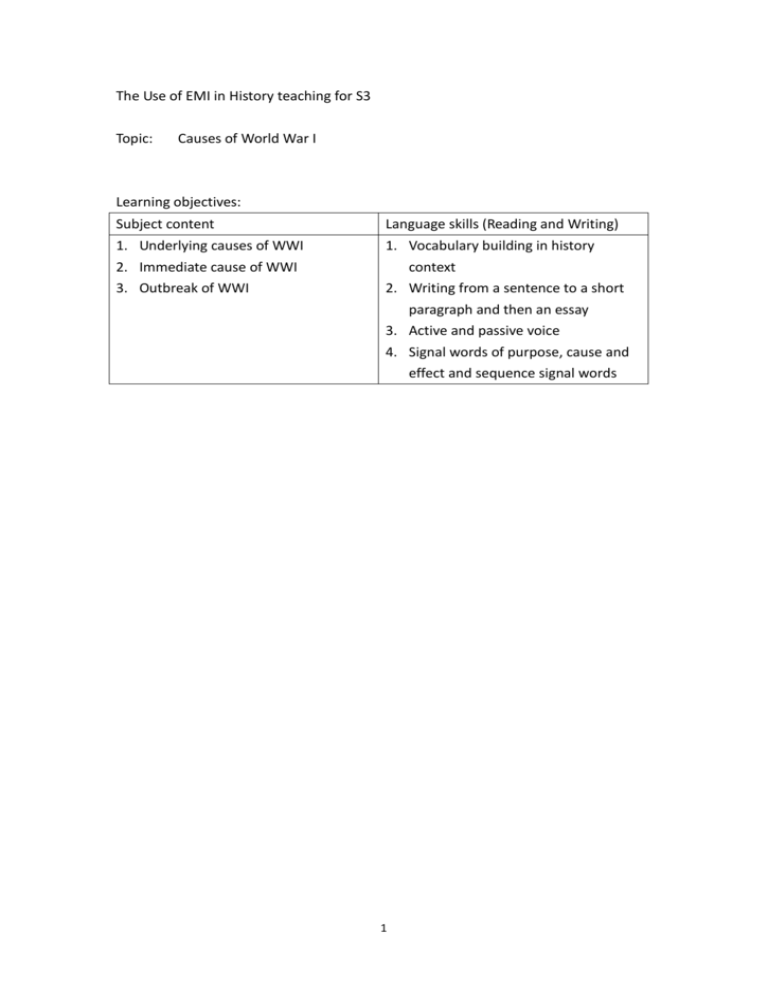
The Use of EMI in History teaching for S3 Topic: Causes of World War I Learning objectives: Subject content Language skills (Reading and Writing) 1. Underlying causes of WWI 2. Immediate cause of WWI 3. Outbreak of WWI 1. Vocabulary building in history context 2. Writing from a sentence to a short paragraph and then an essay 3. Active and passive voice 4. Signal words of purpose, cause and effect and sequence signal words 1 Task 1: Identify the underlying causes of WWI Read the passage and do the exercises that follow. World War One occurred due to many causes. The causes could be classified into the underlying and immediate causes. The underlying causes were: imperialism, militarism, nationalism and alliance system. Imperialism Africa and parts of Asia were points of contention among the European countries. They wanted to get more land and raw materials. The increasing competition and desire for greater empires led to an increase in confrontation and this kind of colonial rivalry helped push the world into World War I. Militarism As the world entered the 20th century, an armament race had begun. Britain and Germany were against one another. The German Kaiser ordered the production of new Dreadnought-class battleships. This created more tension between the two nations and helped push the countries involved to war. Extreme Nationalism In the late 19th century, extreme nationalism was popular among European countries. Different races strived for national glory. It resulted in conflicts when there was a clash of different nationalist movements. Alliance System Within Europe, a system of military alliances was established to provide European powers with a sense of security. Two rival alliances were formed. They were the Triple Alliance consisting of Germany, Austria-Hungary and Italy and the Triple Entente consisting of Britain, France and Russia. As a result of Germany’s build-up in naval resources, Great Britain was forced to abandon its isolation policy. Immediate cause The immediate cause was the assassination of Archduke Franz Ferdinand on 28th June 1914. The assassination occurred during the Archduke's visit to Sarajevo, the capital of Bosnia and Herzegovina. The German Kaiser, Wilhelm II, provided support through a telegram to Emperor Franz Joseph II. This telegram is known today as the "Blank Cheque." It was this reassurance that prompted Austria to declare war on Serbia, which set off a chain reaction of conflicts. Germany was also held responsible for causing the outbreak of WWI because of this. A harsh ultimatum was issued to Serbia. Austria-Hungary gave Serbia 48 hours to reply. Serbia agreed to all terms of the ultimatum but one. Outbreak of the War Austria-Hungary declared war on Serbia, Russia got involved to defend Serbia. Germany, seeing Russia mobilizing, declared war on Russia. France was then drawn in against Germany and Austria-Hungary. Germany attacked France through Belgium pulling Britain into war. 2 A Match the vocabulary in Column A with the meaning in Column B Column A answers Column B Alliance C A. friendly understanding Armament G B. cruel, rough Assassination L C. state of being joined Colonial rivalry O D. being accountable for one’s actions or decisions Declare H E. direct reason Entente A F. group of people with a common culture, language, history Harsh B G. weapons Immediate cause E H. make known clearly Imperialism K I. devotion and loyalty to one’s own nation Isolation N J. become ready for service or action Militarism P K. the policy of extending power and influence of a country/empire in the world Mobilize J L. killing of an important or famous person for money or political reasons Nationalism I M. background of an event Race F N. keeping somebody or something from other people or things Responsible D O. the competition in getting more land Ultimatum Q P. believing in or depending on military strength and methods Underlying causes M Q. final demands to be accepted without discussion 3 B. Crossword puzzle (using the vocabulary in the above passage) Read the instructions below and complete the puzzle. Across 3 Sarajevo Assassination was the _____ cause of WWI. 4 Archduke Ferdinand was killed in this _____. 5 Usually, if a country wants to have war with another country, she has to _____ war on that country first. 6 After the Sarajevo Assassination, Austria-Hungary sent an _____ to Serbia. 9 A word used to describe someone who is unkind. 10 11 In 1904, Britain and France had an agreement in the form of an _____. Under the influence of _____, European countries looked for overseas colonies. 14 The Triple _____ was a kind of union between members. Down 1 _____ was one of the causes of WWI. Peoples wanted to have their own country or to govern themselves. 2 Britain was a _____ empire with a lot of colonies all over the world. 7 To understand the causes of WWI, we have to look into the _____ and 8 12 13 immediate causes. _____ encouraged a country to build up arms. To support their allies, the European countries _____ their military force after the Sarajevo Assassination. Bismarck started the Alliance system because he wanted to keep France in _____. 4 ANSWERS 13 I S O 1 L N A 14 T 3 I A 2 L L I A N T M M E D I O A T E L O O 12 N N N M A S S A S S L 6 A 11 U D 5 S 7 L T I M I N A T A I H E O 4 9 C A T E C L I O B A R E I 8 L U M I N I Z D L E E I D R S H 10 E N T L A Y R I M P E R I A L I N S G M 5 E N S M T E N C. Mind map showing the underlying causes of WWI Complete the mind map by using the information from the passage and reference book. Suggested answers 6 Task 2: Show how nationalism led to conflicts among the powers Europe after 1870 Fill in the name of the country with the information provided. Country Description Britain A strong industrial power A strong navy In keen competition with Germany in naval build-up Trying to end her isolation Germany Defeating France in the Franco-Prussian War Being afraid of French revenge after 1871 Having conflict with Britain and France France Being defeated in 1871 by Germany Looking for allies in Europe in order to take revenge on Germany Italy Expanding overseas especially in Africa Having conflict with France in North Africa Seeking allies AustriaHungary A multi-racial empire Looking for expansion in the Balkans In conflict with Serbia because of her expansion Facing national minority problem Balkan states Being ruled by the Ottoman Empire Having conflicts with one another because of racial and religious differences Attracting the interests of European powers Looking for warm water port Supporting Pan-Slav movement Looking for expansion in the Balkans Russia 7 Write a topic sentence for the information in this table. ____________________________________________________________________ ____________________________________________________________________ e.g. Nationalism was one of the underlying causes of WWI because each country looked for their own interests. 8 Language focus: A. Use of active/passive voice Complete the sentence in column A with the correct choice from Column B. Column A Column B a. tried 1. Britain _____ to end her isolation 2. France _____ by Franco-Prussian War 3. Italy _____ overseas especially in Africa. 4. Austria-Hungary _____ for expansion in the a. looked Balkans. b. was looked 5. The Balkan states _____ by the Ottoman a. ruled Empire. b. was ruled 6. Russia _____ the Pan-Slav Movement. 7. Archduke Franz Ferdinand _____ in Sarajevo. 8. Two rival alliances _____ before WWI. 9. WWI _____ in 1914. 10. The Triple Entente _____ of Britain, France a. made up and Russia. b. was made up Germany b. was tried in the a. defeated b. was defeated a. expanded b. was expanded a. supported b. was supported a. assassinated b. was assassinated a. formed b. were formed a. broke out b. was broke out Write two sentences, one using active voice and the other using passive voice, on one of the causes of the First World War. e.g. Bismarck started the Alliance System. (Active Voice) OR The Alliance System was started by Bismarck. (Passive Voice) The Alliance System was one of the causes of the First World War. (Topic Sentence) a. ______________________________________________________________ ______________________________________________________________ b. ______________________________________________________________ ______________________________________________________________ 9 B. Use of signal words of purpose (in order to/to/so that) Re-arrange the following words into a complete sentence. 1. the colonies / European countries / fought / in order to control / among themselves ___________________________________________________________ ___________________________________________________________ 2. with one another / themselves / European countries / allied / in order to protect ___________________________________________________________ ___________________________________________________________ 3. resources / European countries / to get / raced / land and ___________________________________________________________ ___________________________________________________________ 4. Austria / to fight against / Serbia / Russia / supported ___________________________________________________________ ___________________________________________________________ 5. strengthened / so that / protect themselves / European countries / they could / their military force ___________________________________________________________ ___________________________________________________________ 6. Germany / she could / looked for ally / take revenge on / France / so that ___________________________________________________________ ___________________________________________________________ 7. The Balkan states / the Ottoman Empire / rule themselves / break away from / so that / tried to / they could ___________________________________________________________ ___________________________________________________________ 8. the Alliance System / isolate France / started / Germany / so that / she could ___________________________________________________________ ___________________________________________________________ Write two sentences, one using ‘in order to / to’ and the other using ‘so that’, on one of the causes of the First World War. (With reference to P.7) e.g. Russia expanded in the Balkans in order to look for warm water port. Nationalism was one of the causes of the First World War. a. ______________________________________________________________ b. ______________________________________________________________ 10 Task 3: Show how alliance system led to conflicts among the powers A. Map work Use colour to show the opposing European countries at the outbreak of World War I. Write down the names of the countries. Suggested answer 11 Write short sentences for each treaty signed to show how the 2 opposing camps were formed. Instructions: You may use active / passive voice and the signal words of purpose to write the sentences. 1879 Dual Alliance 1894 Franco-Russian Alliance 1882 Triple Alliance 1904 Entente Cordiale The formation of Two Armed Camps 1907 Anglo-Russian Entente 1907 Triple Entente 1. In 1879, Austria-Hungary and Germany made an alliance to protect themselves from Russia. 2. In 1882, Germany and Austria-Hungary made an alliance with Italy to stop Italy from taking sides with Russia. 3. In 1894, Russia formed an alliance with France to protect herself against Germany and Austria-Hungary. 4. In 1904, France and Britain signed the Entente Cordiale between them. 5. In 1907, the Anglo-Russian Entente was signed between Britain and Russia. 6. In 1907, the Triple Entente was signed between Russia, France and Britain to counter the German threat. 12 B. Cartoon (A chain of friendship) Write short sentences to show how the allies supported each other, using the information from this cartoon, the table below and the above exercise. Source: The cartoon 'A chain of friendship', published in the Brooklyn Daily Eagle, July 1914. Complete the table below What did the powers do on the eve of the First World War? Countries The First World War Germany Hint: 1879 - Germany and Austria-Hungary; (What did Germany do after the Sarajevo Assassination?) Austria Hint: (What did Austria do after the Sarajevo Assassination?) Russia Hint: (Russia being the leader of Slav race) France Hint: 1894 - Russia and France Britain Hint: 1907 Reaction to Germany in 1914 13 Suggested answers Countries The First World War Germany Unlimited support to Austria; declared war on Russia; attacked France through Belgium Austria Declared war on Serbia Russia Mobilized army to help Serbia France Mobilized army to support Russia Britain Joined the war to support its allies Short writing exercise on the impact of Alliance System Use the signal words ‘to / in order to’ and ‘so that’ to complete the exercise e.g. Russia mobilized her army to help Serbia. 1. ___________________________________________________________ ___________________________________________________________ 2. ___________________________________________________________ ___________________________________________________________ 3. ___________________________________________________________ ___________________________________________________________ 4. ___________________________________________________________ ___________________________________________________________ 14 Task 4: Show how colonial rivalry led to conflicts among the powers Below is a table showing the conflicts among the powers before WWI. Britain Britain France Egypt, Sudan France Germany Italy East Africa Morocco Germany Italy Russia The situation of Africa before 1914 15 Russia Persia, Afghanistan Tunisia Write short sentences about their struggle for colonies. Use the information provided in the table and map above. (cause and effect) e.g. Britain and Germany had interests in East Africa, so/as a result they had conflict over the areas in East Africa. 1. ___________________________________________________________ ___________________________________________________________ 2. ___________________________________________________________ ___________________________________________________________ 3. ___________________________________________________________ ___________________________________________________________ 4. ___________________________________________________________ ___________________________________________________________ Suggested answers France and Italy had interests in North Africa, so / as a result they had conflict over Tunisia. France and Germany had interests in North Africa, so / as a result they had conflict over Morocco. Britain and France had interests in North Africa, so / as a result they had conflict over Egypt and Sudan. Britain and Russia had interests in in Middle East and Far East, so / as a result they had conflict over Persia and Afghanistan. France and Germany had conflict in Morocco so / as a result it led to Moroccan Crisis. France and Germany nearly came to a war in order to / to control Morocco. 16 Task 5: Show how militarism led to conflicts among the powers Study the Sources A and B below and find out how militarism led to conflicts among the powers. Source A A British cartoon published in the early 20th century, entitled “The Marine Painters of England and Germany”. * Uncle Edward: King Edward VII of England * William: Kaiser William (Wilhelm) II of Germany Source B Armaments race In the early 20th century, most powers thought military action was the best way to safeguard national interests. The amount of army and navy showed how strong a country was. The powers increased their military expenditure. This intensified the armaments race. Britain and Germany built dreadnoughts to make themselves even stronger. The armaments race did not give the powers a stronger sense of security. It made the international situation tenser and increased the possibility of the outbreak of war. 17 1. According to Source A, what did William want to do? ___________________________________________________________ 2. ___________________________________________________________ According to Source A, what was Uncle Edward’s reaction? (Quote from the source and then rewrite in your own words) ___________________________________________________________ 3. ___________________________________________________________ Identify the underlying cause of WWI. Explain your answer with reference to the 2 Sources. ___________________________________________________________ 4. ___________________________________________________________ How did the underlying cause you identified in question 3 lead to the outbreak of the First World War? Explain your answer with reference to Sources A and B? ___________________________________________________________ ___________________________________________________________ Suggested Answers 1. According to Source A, what did William want to do? William wanted to build Dreadnought 2. According to the Source A, what was Uncle Edward’s reaction? (Quote from the source and then rewrite in your own words) Uncle Edward said, “Your little marine masterpiece is too ambitious; keep it as a study.” Edward VII was unhappy with William’s plan for this would challenge England’s naval supremacy. 3. Identify the underlying cause of WWI. Explain your answer with reference to the 2 Sources. The 2 Sources showed how militarism led to conflicts among the powers. Source A showed that Germany wanted to challenge England’s naval supremacy by building the dreadnoughts. Source B showed the results of armaments race. 4. How did the underlying cause you identified in question 3 lead to the outbreak of the First World War? Explain your answer with reference to Sources A and B? The building of dreadnoughts by Germany intensified the armaments race as shown in Source A. Source B explained that the armaments race did not give the powers a stronger sense of security. It made the international situation tenser and increased the possibility of the outbreak of war. 18 Task 6: Write a short paragraph about any ONE of the underlying causes 1. Complete the table below 2. Use the information in the table to help you write a short paragraph about any one of the underlying causes. (Remember to start with a topic sentence.) (cause and effect) e.g. Extreme nationalism was one of the underlying causes of WWI because the powers wanted to increase their glory by expansion. As a result, there was war when they had conflicts. Underlying causes Meaning Effects Extreme Nationalism The Great Powers It resulted in conflicts when increased their national there was a clash of glory by expansion. nationalism. Militarism The Great Powers It increased tension. increased their size of their They were less willing to armed force. settle their conflicts by peaceful means. Imperialism The Great Powers tried to It increased tension among gain colonies to build up them. their empires. Alliance System Two armed camps were It turned a local war into a formed. They were the general war. Triple Alliance and Triple Entente. 19 Task 7: Write a short paragraph about the outbreak of WWI. How do we write an essay? 1. Start with writing a single paragraph Short writing exercise: Write a paragraph describing WWI. Look at the information in the previous exercises and textbook to find answers to the 5 questions below. Make notes of the answers to the questions. Then write out the answers in a simple paragraph. Add other information to the paragraph if necessary. A. When did the First World War start? B. Which two alliances went to war? C. What incident caused the war to start? D. What happened in the incident? E. How long did the war last? A. The First World War started in 1914. B. The two alliances – the Triple Alliance (Austria, Italy and Germany) and the Triple Entente (Britain, France and Russia) joined the war. C. The War was caused by the Sarajevo Assassination. D. The incident happened in Sarajevo when Ferdinand, the heir to Austrian throne, was assassinated. E. The War was fought for 4 years. Suggested answer The First World War started in 1914. The two alliances – the Triple Alliance (Austria, Italy and Germany) and the Triple Entente (Britain, France and Russia) joined the war. The War was caused by the Sarajevo Assassination. The incident happened in Sarajevo when Ferdinand, the heir to Austrian throne, was assassinated. Austria sent an ultimatum to Serbia but it was refused by Serbia. Since Austria got help from Germany whereas Serbia gained support from Russia, this soon became a world war. The First World War was fought for 4 years. 2. Give tips on writing an essay A. Plan your essay beforehand. B. Break down the essay into different paragraphs. C. Use short paragraphs. D. Remember to have only one central idea for each paragraph. 20 3. E. Use topic sentences, connectives and signal words to help organize your essay. F. Give a concluding sentence at the end of each paragraph. Use a template to help students organize and write their answer for an essay (Use sequence signal words to help organize essay) Introduction Content/Body Opinion – first measure/reason/factor/perspective (First/Firstly) Reasoning/explanation Examples/evidence (if any) Limitations/conclusion Content/Body Opinion – second measure/reason/factor/perspective (Second/Secondly) Reasoning/explanation Examples/evidence (if any) Limitations/conclusion Content/Body Opinion – third measure/reason/factor/perspective (Third/Thirdly) Reasoning/explanation Examples/evidence (if any) Limitations/conclusion Conclusion 4. Give the students a question to practise What were the underlying causes of the First World War? Sarajevo Assassination turn a local conflict into a general war? Use the tips learned before to help them write this essay. 21 How did the A. B. Plan your essay before hand. Read the question carefully. Find the question word of the question. (What/How) The students should be able to tell that the answer can be divided into TWO parts. Break down the essay into different paragraphs. (1) Preparation for ‘what were the underlying causes’. Use the completed exercise in task 6 (2) Preparation for ‘how did the Sarajevo Assassination turn a local conflict into a general war’. Use the completed exercise in task 3B C. Use short paragraphs e.g. Task 6: Write a paragraph on one of the underlying causes. Extreme Nationalism made the Great Powers eager to increase their national glory by expansion. It resulted in conflicts when there was a clash of nationalism. Task 3B: Write a paragraph on ‘how a local conflict turned into a general war’. In 1914, the Archduke Ferdinand of Austria was assassinated by a Serbian during his visit to Sarajevo, the capital of Bosnia. With unlimited support of Germany, Austria declared war on Serbia. When Russia mobilized its army to support Serbia and France mobilized to support Russia, Germany declared war on them and attacked France through Belgium. Britain then joined the war to help Belgium and its allies. The First World War broke out. D. Remember to have only one central idea for each paragraph. What is the central idea of each of the following paragraphs. 1. World War I was a military conflict lasting from 1914 to 1918 which involved nearly all the biggest powers of the world. 2. It involved 2 opposing alliances – the Allies and the Central Powers. The countries of the Allies included Russia, Britain, France….. The countries of the Central Powers included Germany, Austria-Hungary, 22 Turkey and Bulgaria. 3. World War I was triggered on 28 June 1914 by the Sarajevo Assassination. The Assassination was planned by a Serbian terrorist group, the Black Hand. 4. The War had many causes. A tangle of alliances was made between countries, to maintain a balance of power in Europe, which brought about the scale of conflict. The Bosnian Crisis angered Serbia. Countries were building their forces, arms and battleships. Countries wanted to regain lost territories from previous conflicts and build empires. http://www.kidskonnect.com/subjectindex/16-educational/history/287-world-war-i.html 5. Tips for teachers A. The short writing exercises can be done separately before teaching them how to write an essay. B. After teaching them the above, the students can be asked to complete writing an essay. 23 Appendix 1. Vocabulary list A. Places (Noun) - country Britain Brit.ain France France Germany Russia Rus.sia Italy I.ta.ly Serbia Austria - Hungary Aus.tri.a - Hun.ga.ry Ger.many Ser.bi.a B. Places (Noun) Mediterranean Cen.tral Sea 地中海 Med.i.ter.ra. Central Europe ne.an 中歐 Bosnia and Bos.ni.a Ot.to.man Herzegovina Her.ze.go.vi. Empire na 鄂圖曼帝國 Em.pire Alsace – Lorraine Al.sace Asia A.sia 阿爾薩斯.洛林 - Lor.raine Balkan Bal.kan Africa Af.ri.ca Peninsula Pen.in.su.la 波斯尼亞 及 Ottoman Eu.rope 黑塞哥維娜 巴爾幹半島 C. People from different countries (Noun) Russians Rus.sians French French Italians I.tali.ans Germans Ger.mans Serbians Ser.bi.ans Asians A.si.ans British Bri.tish Africans Af.ri.cans Austro – Aus.tro – Balkan Bal.kan Hungarians Hun.ga.ri.ans people peo.ple 24 D. Causes of WWI Imperialism Im.pe.rial.ism militarism mi.li.tar.ism Alliance Al.li.ance Extreme Ex.treme System Sys.tem Nationalism Na.tion.al.ism Armaments Ar.ma.ments Economic and E.co.no.mic and Race Race colonial rivalry co.lo.ni.al ri.val.ry D1. Economic and colonial rivalry (Imperialism) nation na.tion Industrialization in.dus.tri.al.i.za.tion tension ten.sion raw materials raw ma.te.ri.als colonial expansion co.lo.ni.al overseas markets over.seas expensive ex.pen.sive European powers Eu.ro.pean powerful pow.er.ful tariffs pow.ers ta.riffs ex.pan.sion mar.kets D2. Extreme Nationalism Pan – Germanism Pan.Ger.man.ism Language Lan.guage Pan – Slavism Pan.Slav.ism Independent In.de.pend.ent revengeful re.venge.ful tradition tra.di.tion National glory Na.tion.al glo.ry Foreign expansion For.eign ex.pan.sion D3. Armaments race (militarism) dreadnoughts dread.noughts suspicion sus.pi.cion Army Ar.my navy na.vy 25 D4. Alliance System Triple Alliance Tri.ple Al.li.ance Triple Entente diplomacy di.plo.ma.cy disputes Tri.ple En.tente dis.putes Opposing camps Op.pos.ing camps enemies e.ne.mies E. Events leading to the War Moroccan Crisis Mo.roc.can Bosnian Crisis Cri.sis 2. Bos.ni.an Cri.sis Ultimatum Ul.ti.ma.tum mobilization mo.bi.li.za.tion Unlimited support Un.li.mit.ed Aus.tri.an throne sup.port Austrian throne declare de.clare heir heir Signal Words A. Cause-and-Effect signal words Cause Effect Colonial rivalry caused the Powers to gain colonies or areas to build up their empires it increased tension among the Powers. Nationalism caused the Powers to increase their national glory by expansion it resulted in conflicts when there was a clash of nationalism. The armaments race caused the Powers to increase the size of their armed force ,so OR ,as a result The Alliance System caused the Powers to form two rival camps in Europe it increased tension and made the Powers less willing to settle their conflicts by peaceful means. it turned a local war into a general war. 26 B. Sequence signal words Sequence The 4 underlying causes Firstly, colonial rivalry caused the Powers to gain colonies or areas to build up their empires First, Secondly, nationalism caused the Powers to increase their national glory by expansion Second, Thirdly, the armaments race caused the Powers to increase the size of their armed force Third, Lastly, the Alliance System caused the Powers to form two rival camps in Europe Last, Last but not least, C. Signal words of purpose Action Purpose France and Germany speeded up their industrialization process (so that) they could become stronger. European powers began to impose high tariffs on foreign goods (so that) they could protect their local industries. European powers began to compete for colonies (so that) they could get more raw materials and a larger overseas market for their industrial goods. (in order to) become stronger. (in order to) protect their local industries. (in order to) get more raw materials and a larger overseas market for their industrial goods. European powers competed in building dreadnoughts (so that) they could control the sea when a war broke out. (in order to) control the sea when a war broke out. 27 D. Signal word for change of idea Positive clause Negative clause Italy was a victorious power Italy was a member of the Triple Alliance she was unhappy with the Paris Peace Settlement. but Britain was the strongest power before WWI she joined the Allied Powers in the First World War. her power was on the decline after WWI. 28
